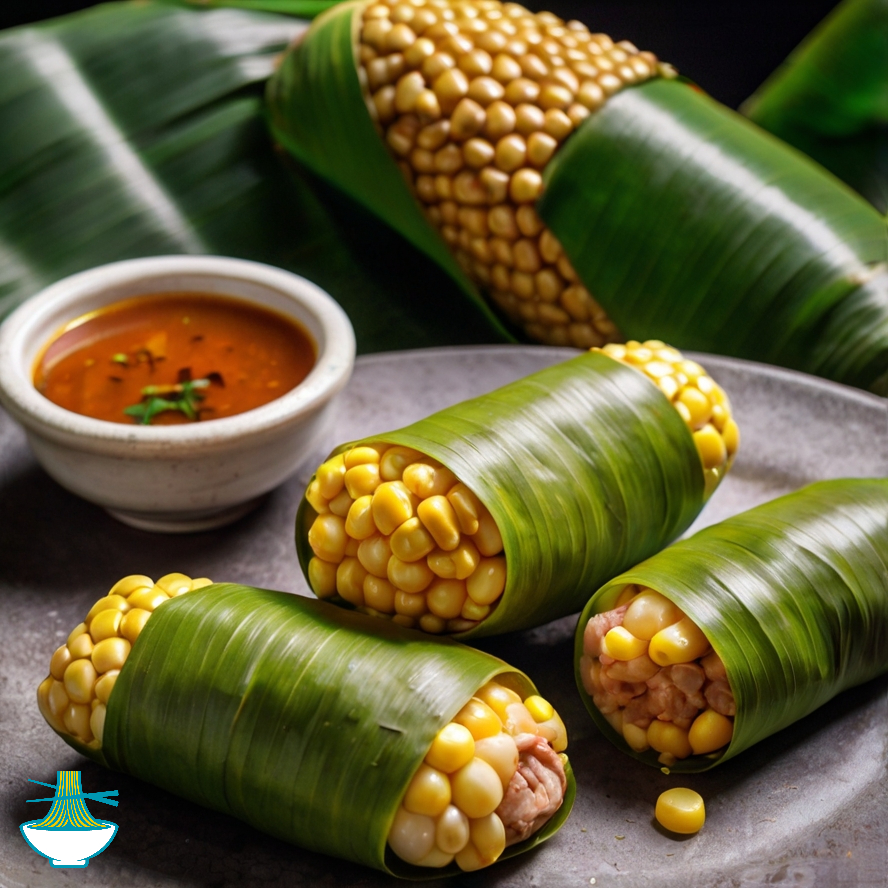Bollos Pelones or Latino Cornmeal Dumplings are a traditional Venezuelan dish consisting of corn dough filled with flavorful stewed meat,typically beef or pork.
The dough is wrapped in banana leaves, which impart a unique aroma and flavor, and then boiled until cooked through. This dish has its roots in Venezuelan cuisine, particularly in regions like Carabobo and Lara, where it's a beloved part of local culinary heritage.
The history of Bollos Pelones traces back to Indigenous influences on Venezuelan cooking, incorporating techniques like using corn dough and banana leaves in food preparation. Over time, it has evolved into a cherished comfort food enjoyed during festive occasions and family gatherings, showcasing the rich flavors and cultural diversity of Venezuelan cuisine.
Ingredients:
- Corn dough (masa harina)
- Stewed meat (beef or pork), seasoned to taste
- Banana leaves (cleaned and cut into squares)
- Salt and pepper (for seasoning, as needed)

Method of Preparation:
1. Prepare the corn dough according to package instructions or traditional recipes, adding water and salt to create a pliable dough.
2. Season the stewed meat with salt and pepper, cooking it until tender and flavorful.
3. Take a portion of the corn dough and flatten it into a circle, placing a spoonful of the stewed meat in the center.
4. Fold the dough over the meat to form a ball, ensuring the filling is enclosed completely.
5. Wrap the filled dough ball in a square of banana leaf, folding it securely to hold the bollo together.
6. Repeat the process for the remaining dough and filling, creating several bollos.
7. Bring a pot of water to a boil, then add the bollos wrapped in banana leaves.
8. Boil the bollos for about 45-60 minutes, or until the corn dough is cooked through and tender.
9. Remove the bollos from the water and allow them to cool slightly before unwrapping and serving.
Nutrition Value:
1. Corn Dough (Masa Harina):
- Calories: About 100-110 calories per 1/4 cup (dry)
- Carbohydrates: Approximately 20-25 grams per 1/4 cup (dry)
- Protein: Around 2-3 grams per 1/4 cup (dry)
- Fat: Minimal, usually less than 1 gram per 1/4 cup (dry)
- Sodium: Varies based on brand, typically around 0-5 mg per 1/4 cup (dry)
- Cholesterol: Zero cholesterol
- Vitamins and Minerals: Contains iron, niacin (vitamin B3), and some calcium and potassium.
- Nutritional Benefit: Masa harina is made from corn, providing essential carbohydrates for energy, a moderate amount of protein, and small amounts of vitamins and minerals, making it a good source of energy and nutrients for recipes like tamales or tortillas.
2. Stewed Meat (Beef or Pork), Seasoned to Taste:
- Calories: Depends on the cut and fat content, roughly 200-300 calories per 100 grams (cooked weight)
- Carbohydrates: Negligible, usually less than 1 gram per 100 grams
- Protein: High, typically 20-30 grams per 100 grams
- Fat: Varies based on fat content, ranging from 10-20 grams per 100 grams
- Sodium: Varies depending on seasoning, marinade, or broth used
- Cholesterol: Depending on the cut and fat content, can be moderate to high
- Vitamins and Minerals: Rich in B vitamins (B12, B6), iron, zinc, and selenium.
- Nutritional Benefit: Provides high-quality protein, essential amino acids, and valuable nutrients like iron and B vitamins for muscle health, energy production, and overall well-being.
3. Banana Leaves (Cleaned and Cut into Squares):
- Calories: Very low, negligible contribution to calorie intake
- Carbohydrates: Minimal, mostly fiber
- Protein: Negligible
- Fat: Negligible
- Sodium: Very low
- Cholesterol: Zero cholesterol
- Vitamins and Minerals: Contains small amounts of vitamins A and C, plus some potassium and magnesium.
- Nutritional Benefit: While not a significant source of nutrients, banana leaves are used for wrapping foods, imparting a subtle aroma and flavor. They also add a touch of tradition and authenticity to dishes like tamales or steamed foods.
4. Salt and Pepper (For Seasoning, as Needed):
- Calories: Negligible, no significant calorie contribution
- Carbohydrates: No carbohydrates
- Protein: No protein
- Fat: No fat
- Sodium: High in salt, use sparingly for sodium-sensitive individuals
- Cholesterol: No cholesterol
- Vitamins and Minerals: Minimal, primarily sodium for salt
- Nutritional Benefit: Salt enhances flavor, while pepper adds a hint of spiciness. However, excessive salt intake can contribute to high blood pressure, so it's essential to use salt in moderation and consider alternatives for flavor enhancement, such as herbs and spices.


Comments